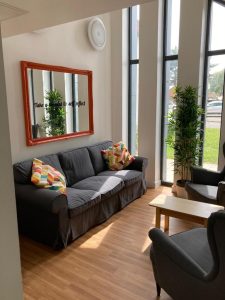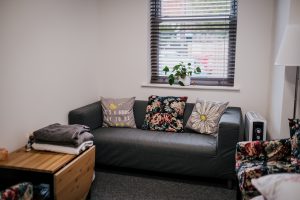Everything you need to know about Refuge
YMCA Together offers a range of services for people experiencing Domestic Abuse.
In this article, we’ll explore our Refuge service, which provides 28 self-contained properties in the North and South of Liverpool for women and children fleeing domestic abuse.
Our self-contained properties are in secure locations with support 24 hours a day, seven days a week.
We work in a psychologically informed way across our services. This means we consider individual needs and focus on what’s important to help people create positive, sustainable futures.
Our two Liverpool-based family refuges are:
Fae House, in the north of the city, can accommodate ten families in eight two-bedroom flats and two three-bedroom houses.
Grace House, in south Liverpool, offers ten two-bedroom, two three-bedroom, and six single-room flats.
Being referred to YMCA Together’s Domestic Abuse Services
All referrals for Refuge come through Housing Options. We also accept self-referrals but not direct referrals from other agencies or service providers.
Upon a referral from Housing Options, we assess the person to identify potential Drug and Alcohol use or Mental Health concerns. If we identify these issues, we’ll refer the person to our Domestic Abuse Recovery Service (DARS) to support them with their additional needs.
Alternatively, we can house people at Safe Accommodation if Refuge isn’t suitable.
How does Refuge work?
Once a person is in Refuge, we support their referral to a Multi-Agency Risk Assessment Conference (MARAC). This is a crucial step where professionals assess the risks associated with the case and identify the most effective way to keep the person safe.
Following the MARAC assessment, the person may be offered additional support from an Independent Domestic Violence Advocate (IDVA).
Refuge offers emotional support, safety planning and help with preparing for the future.
We also work with partner organisations to offer health and wellbeing classes, access to the Freedom Programme, tailored mental health support, and holistic therapies such as yoga and massage.
What’s the accommodation like?

When people think of a refuge, they often imagine bare rooms with bunk beds, a sink in the corner, and strict rules to follow.
So we understand why some people are reluctant when we offer them this service.
But our refuges are different. YMCA Together offers warm, safe, comfortable properties in the community. Everybody gets their own flat with their own front door, allowing for secure and independent living with our support, while respecting your privacy.
Each Refuge has a communal kitchen, lounge, bathroom, and playroom, allowing people to build relationships with other individuals while having the security of locking their front door.
Safety is a priority, but we don’t try to control people at Refuge. We’re mindful of what people have been through and do everything we can to create a welcoming, homely environment where you feel accepted and included.
For example, we allow people to keep their mobile numbers and social media profiles to interact with friends and family and not feel isolated.
Our robust vetting process means we let Refuge residents have visitors so they can enjoy company and companionship. We also accept pets.
Breaking down barriers
I’m worried that people won’t believe I’m a Domestic Abuse Survivor.
Worrying that people won’t believe your experience of Domestic Abuse can be a barrier to seeking support. We believe you.
That’s why you don’t need to report the perpetrator to the police or provide us with detailed information before accessing our services.
I own a property. Am I entitled to your support?
People who own their homes often assume they’re not entitled to Domestic Abuse support. This is not the case. YMCA Together is here for you, regardless of your financial or home ownership situation.
Can I access Refuge if I’m working or have teenage children?
In some UK locations, refugees will only accept employed people if housing benefits cover the full cost of the accommodation.
However, we’re lucky to have the support of Liverpool City Council, which will pay the difference so people can access our Refuge service.
We also allow families with children up to the age of 18 to access our services so people can remove them from abusive environments.
I don’t want to take my children away from friends and family

Children are a primary concern in abusive environments. Despite knowing they want to leave the perpetrator, people often worry about taking their children out of the home environment and leaving friends and family behind.
We accept people with children up to 18 years of age in our Refuge service. We’re also exploring safe ways for children to welcome their friends to our accommodation so they can stay in touch with their friends and loved ones.
I don’t want to leave my home
Nobody wants to leave their home. And leaving your home in the hands of a Domestic Abuse perpetrator can feel particularly unfair. Social services may insist you leave your home for your children’s protection in certain circumstances.
These situations often make it challenging for people to build relationships with the Refuge team. However, we take the time to get to know you, build rapport, and work alongside you.
How long before I can leave Refuge?
People can stay at Refuge for up to 12 months. However, we aim to house them in their own properties as soon as you’re ready and it’s safe to do so.
We work with Property Pool Plus to help you find affordable housing to rent in Liverpool, Knowsley, Sefton, Wirral, Runcorn, or Widnes.
Everybody accessing Refuge service is automatically placed on Band A, the highest priority for housing. Properties become available weekly, and when you’re ready, we’ll work alongside you and Property Pool Plus to bid on suitable, safe housing to meet your needs.
Before you leave, we’ll speak to you about safety planning and how to spot relationship red flags to make sure you’re ready.
What additional services are available?
As part of our work at Refuge, we link people and their families with healthcare professionals, education providers and support programmes.
All of our programmes are optional, meaning we’ll never force you to engage with a service if you’d prefer not to.
What happens after I leave Refuge?
After you leave Refuge, we offer follow-on support for six months based on your preferences. This can include regular visits or calls, arranging tenancy support, and linking you with additional services if needed. We’re here to ensure your transition is as smooth as possible.
For example, we can visit or call you once a week, arrange tenancy support, and link you in with additional services if needed.
You can come back to Refuge or contact us for support at any time.
We’re here for you, wherever you’re at.
Do you want to see what our refuges look like? Ask us to send you our walkthrough video.
YMCA Together acknowledges the support of partner organisations, First Person, Liverpool Domestic Abuse Service and South Liverpool Domestic Abuse Service.

